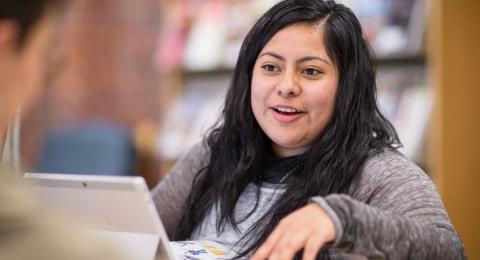Gain an understanding of the biological and social elements of human behavior
What is psychology?
Psychology is the scientific study of behavior and mental processes — essentially what we do, and everything involved in thinking. Contemporary psychology largely utilizes the biopsychosocial approach to understand everyday behaviors like eating, sleeping and exercising, as well as atypical behaviors such as addiction, depression and other psychological disorders. In this minor, you’ll be introduced to scientific research methods and statistics along with the option to study areas such as neuropsychology, child development, and mood and attention disorders. Combine this minor with a major such as art, biology, education, healthcare, justice studies or social work to prepare for a wide variety of career opportunities or for graduate studies.
Why study psychology at UNH Manchester?
Guided by faculty who are experts in their disciplines, psychology minors at UNH Manchester develop a foundation in the field as well as skills that are in demand in many industries, such as listening, empathy, scientific communication, empirical thinking and data analysis. Research is central to the program, offering students hands-on learning opportunities in sensation and visual perception, child psychology, neuropsychology and community-based research. Manchester is the state’s business hub, and UNH has partnered with many local organizations that offer real-world opportunities students. The psychology minor brings a unique perspective on society and human behavior that adds breadth to any major and adds a set of skills that will stand out to employers in a variety of industries.
Potential career areas
- Academic or career counseling
- Alcohol or drug counseling
- Business
- Criminal psychology
- Marriage and family therapy
- Mental health counseling
- Psychobiology
- Recreational therapy
- School psychology
- Social work
Curriculum & Requirements
The Psychology minor brings a unique perspective on society and human behavior to your studies and adds a set of skills that makes you stand out to employers in a variety of industries.
Minor Requirements
| Code | Title | Credits |
|---|---|---|
| PSYC 401 | Introduction to Psychology | 4 |
| Two PSYC courses at the 500-level or higher | 8 | |
| Two additional PSYC courses | 8 | |
| Total Credits | 20 | |
- No more than 4 credits of PSYC 795 Independent Study may be applied to the minor.
- A maximum of 9 approved psychology transfer credits can be applied to the UNH psychology minor.
- Transfer courses must be evaluated for their equivalency. Only courses taken in a psychology department can be applied towards the minor.
- Three-credit transfer courses can be applied as only three credits. Students must make up the credit deficit created by acceptance of transfer courses, with one exception: one three-credit course accepted in transfer may be applied for a total of 19 credits.
- AP Psychology transferred into UNH is equivalent as PSYC 401 Introduction to Psychology.
Explore Program Details
-
Associate ProfessorChair, Department of Life SciencesEmail: Alison.Paglia@unh.eduPhone: (603) 641-4103
-
Associate ProfessorInterim Chair of Life SciencesEmail: Daniel.Seichepine@unh.eduPhone: (603) 641-4134
Because of the growth and breadth of our program, we have four lab spaces designed to meet your unique research and experimentation needs.
How do young children respond emotionally when faced with unusual or surprising experiences? This lab was recently designed to answer these kinds of questions. One room serves as a student work area and greeting room for welcoming families, complete with child-friendly toys. This is adjoined by an observation room complete with a one-way mirror and audio-visual recording equipment, allowing students to evaluate child emotional experiences through observational, subjective and physiological measures.
Examine the brain and its relation to the emotional, physical, cognitive and social behaviors in people. You’ll delve into the long-term effects of brain injuries and neurological diseases, perform brain dissections to study the physiology of pathological states and use clinical neuropsychology tools to evaluate IQ, learning and memory.
Each year students conduct community-based research projects with local partners like the YWCA, New Hampshire Hospice and Palliative Care Organization, Boys & Girls Club and more. The Paglia Research Lab is entirely devoted to this research, giving you the privacy you need to conduct phone interviews, securely store focus group, interview and survey data, and prepare your findings.
This multi-purpose, two-room teaching and research laboratory gives upper level students hands-on experience in visual perception. You’ll conduct research individually, in teams and with faculty, using industry tools like a Wheatstone stereoscope to project 3D images, pump-based chair for subject positioning and computer-controlled LED-based colorimeter for experiments in color-naming and color-matching.





